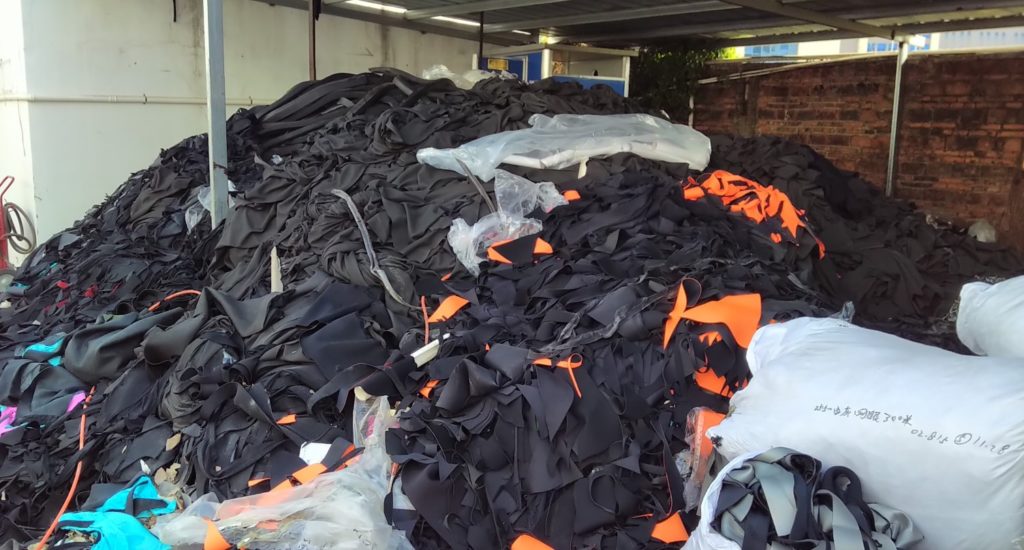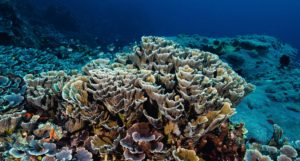UK wetsuit recycling among new ‘future fibres’ projects

Credit Circular Flow
A plan to develop the UK’s first wetsuit recycling facility is among eight new projects funded by Future Fibres Network Plus.
Future Fibres Network Plus – which aims to bring environmental science into the heart of the UK fashion, clothing and textile sectors – is a network led by the University of Exeter, collaborating with the universities of Leeds, Huddersfield and Plymouth, University of the Arts London, and the UK Fashion and Textile Association (UKFT).
Many wetsuits are made from neoprene – but the UK currently has no way of recycling them, meaning more than 380 tonnes is burned or landfilled each year.
The neoprene recycling project is one of the eight mini projects newly funded by the network.
Led by the University of Plymouth and working with industry partner Circular Flow, it will examine the scope for developing a UK neoprene recycling facility to help make the surfing and diving industry more circular or sustainable.
Circular Flow already has a facility in Bulgaria, but establishing one in the UK – home to some of the world’s most popular surfing locations – would be a significant development.
“Many of those who buy and wear wetsuits have a genuine interest in the environment, and therefore in the sustainability of these products. However, wetsuits are one of the hardest products to recycle and the possibility of opening a recycling facility in the UK is very exciting,” said Emma Major-Mudge, Head of Sales and Commercial Partnerships at Circular Flow.
Dr Kayleigh Wyles, Associate Professor in Environmental Psychology at the University of Plymouth and project lead, added: “Our project will investigate the level of interest among UK businesses for returning end-of-life wetsuits and accessories to a UK facility where they can be turned into new and useful products. We also aim to understand consumers’ willingness to purchase and wear recycled neoprene products, and explore the logistics of developing a recycling facility.”
Dr Katie Major-Smith, a post-doctoral researcher involved in the project, said: “Ultimately, we hope to promote circularity in the water sports industry and keep hundreds of tonnes of wetsuits out of landfill.”
If the findings suggest there is sufficient support for a neoprene recycling facility, the team will develop an investment pack to share with funders to help build it.
Through its flexible fund, Future Fibres Network Plus is investing a total of £1 million in the eight projects. The others are:
- FABRIOTIC (led byNorthumbria University in partnership with Procter & Gamble): Sports clothes are typically discarded prematurely because they develop a bad smell known as “permastink”. FABRIOTIC will pilot clothing containing bacteria spores that could prevent permastink, giving athletic clothes a longer lifespan.
- Bio-Based Sequins (led by University of the Arts London in partnership with Sequinova): Sequins are made from non-biodegradable plastics and toxic dyes, and are usually thrown away after use. This project will develop a sustainable manufacturing process for cellulose-based, recyclable sequins.
- All Cellulose Composite (led by University of the Arts London in partnership with Ananas Anam UK Ltd and Salt): Using fibres made from pineapple, this project aims to broaden the use of natural fibres. Potential applications include structured materials for the luxury hospitality sector, automotives, footwear and accessories.
- UP (Unlocking potential of post-consumer textiles (led by the University of Leeds in partnership with UKFT and ReLondon): This project will map and assess how used textiles are sorted and graded in the UK, and evaluate what textiles are required by key organisations that reuse or recycle them. It will involve textile sorters, waste authorities and management companies, non-profits, brands with take-back systems, recyclers, resale platforms, upcyclers and re-manufacturers.
- Coloration in Flow (led by theUniversity of Leeds in partnership with Keracol): Dyeing fabric has a high impact on the environment, both in terms of energy and materials. This project will investigate the possibility of reducing this by dyeing fibres during wet-spinning (spinning fibres into yarns while they are in a liquid state) as opposed to more traditional methods. It will also explore the levels of microfibre loss during dyeing by these different methods.
- Increasing Textile Circularity (led by theUniversity of Plymouth in partnership with Plan B Recycling Technologies Ltd): Polyester – the most commonly used fibre – offers significant fibre-to-fibre recycling potential. However, recycled polyester pellets are often of low quality due to contamination by other materials . This project will develop a pre-recycling treatment process to improve recycled polyester quality. It will address barriers to fibre recycling, examine the levels of microfibre release during laundry, and create a knowledge repository to optimise recycling processes.
- Future Fibres CollaborAcademy (led byUniversity of the Arts London): This project aims to develop a syllabus to help researchers and industry professionals work together in a circular and sustainable textiles “ecosystem”. It will enable post-grad and doctoral students from the environmental and materials sciences, textile and fashion design to come together and explore their differences and common ground.
Future Fibres Network Plus sits within the Network Plus in Circular Fashion and Textiles, a collaboration of three sub-networks that seeks to understand and drive the fashion and textile industry towards sustainable and responsible practices. The Network Plus is part of the UKRI £15million Circular Fashion and Textile Programme.
To find out more about Future Fibres Network Plus, visit: https://futurefibresnetworkplus.com



